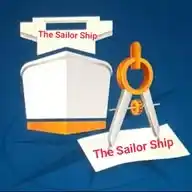
Chief Mate Oral Set The Sailor Ship
June 11, 2025 at 10:55 AM
[10/06, 12:03] +91 94444 68409: If your vessel is 100 nautical miles away from a vessel in distress and you do not have an ENC (Electronic Navigational Chart) for that area, but you need to proceed and render assistance, here's a structured approach based on good seamanship, SOLAS obligations, and safety principles:
---
🔴 1. Acknowledge Obligation to Assist
As per SOLAS Chapter V, Regulation 33, the master of a ship is obligated to proceed with all speed to assist persons in distress at sea, provided it can be done without serious danger to their own vessel and crew.
---
🟡 2. Obtain Chart Coverage
Since you lack ENC coverage for that area:
✅ a. Request Temporary ENC Access
Contact your chart provider (e.g., NAVTOR, PRIMAR, UKHO, etc.) to obtain a temporary permit or emergency ENC for the area.
Use the ship's email or communication system (e.g., Inmarsat, Iridium) to request and download the ENC via the Chart Correction System or ECDIS software.
✅ b. Alternative Charts (Raster or Paper)
Use Raster Navigational Charts (RNCs) if available.
If you carry paper charts, plot your route manually.
If neither is available, request chart information from MRCC, nearby vessels, or shore stations.
---
🟠 3. Use of Other Navigational Tools
In the absence of proper charts, apply enhanced situational awareness:
Use AIS, radar overlay, depth sounder, and satellite imagery if integrated.
Utilize passage planning tools like Navionics on tablet or ECS (Electronic Chart Systems) as supplementary tools (not primary for SOLAS carriage).
---
🔵 4. Get Information from RCC/MRCC
Inform the nearest Maritime Rescue Coordination Centre (MRCC) or coastal authority of your intention.
Request:
Navigational warnings
Known hazards
Recommended tracks
Port/anchorage info
Chart data
---
🟢 5. Safe Navigation Practices En Route
Proceed at safe speed, use lookouts, and monitor depth, radar, and AIS constantly.
Prefer deep and open waters where possible.
Avoid areas of known hazards, shallows, or traffic separation schemes unless you have sufficient data.
---
🔘 6. Log and Report
Record:
The situation
Communication with RCC
Actions taken
Notify company (DPA) and Class if required.
---
✅ Summary – Step-by-Step:
---
Let me know if you want a checklist format for bridge team briefing.
[10/06, 12:16] +44 7948 538896: Thanks for Chat GPT.
Assess SAR position generally on small scale planning chart.
Two scenarios
1all clear. Eg mid ocean. Proceed cautiously plus order permits plus contact nearby assets incl distress vessel to confirm if any danger under 100 m depths.
2. Not clear. Then following.
Request ENC permit on email. Arrives quickly. Update ECDIS
Proceed.
===
Never put your own ship in danger. You don’t want to be casualty #2 by rushing in.
Stop. Think. Act. Stay safe.
[11/06, 15:00] +91 77988 53069: MMD Kolkata
Fun 1
4th attempt
Date : 11.6.2025
Internal : VSM
External : nitin nayar
1 mine clearance, Dredger,Normal pdv vessel. cardinal cards
2 weather routing types
3 ship reporting system explain any one
4 condition for trs
5 Quote rule 2/example of rule 2
6 how to calculate Amplitude
7 which gyro will have damping in tilt
8 to which vessel eta is applicable
9. flinder bars 10.katabatic /anabatic wind/indian ship reporting system ms notice
[11/06, 15:00] +91 77449 49053: Date 11 June 2025
Internal : Manhas
External: nayyar
Function 1( 4th Attempt)
Started with cards night cards, day cards and cardinal marks
Quote 19d and Rule 2
Iamsar
Ship reporting (India)
Trs
Tropical depression and which latitude occurs
Eta Requirement
Magnetic compass regarding coffiecint b
Damping error
Components of Magnetic compass
Eta procedure
Katabatic and anabatic wind
Result : Pass
Finally mates 🎉 🎉 😄 😄